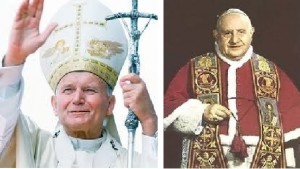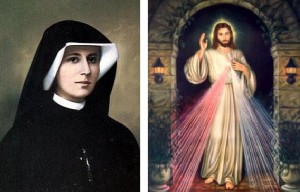Last Sunday Was A Very Special Day:
Posted by SociusMay 1
The 2nd Sunday of Easter was quite an eventful day. In the long past, and in comparison with Easter Day, it was always referred to as Low Sunday; nowadays, with our more recent recognition of St. Faustina, and her diary-cum-writings on the subject of the Divine Mercy, it is often referred to as the Divine Mercy Sunday, or the Second Sunday of Easter. But, this is not all, for those who recall Father Jonathan’s blog of last week, will realise at once, that two very great and holy men, in the identities of Pope John XXIII and Pope John Paul II, were canonised by Pope Francis, that same day.
Popes John Paul II and John XXIII
At this point, I can hear you say, “Well, that’s enough for anybody!” But, no, it is not – for – on this quite momentous day, one must remember what the Gospel is about. The Gospel of St. John, (20:19-31) tells of Jesus’ visit to the disciples, one week after his Resurrection. He showed them his hands and his side – but Thomas, one of the Twelve, was not there, and we have his quite remarkable statement that he will not believe, unless he is able to see, and put his fingers into the holes made by the nails, and put his hand into his side. We recall then that eight days later Jesus appears again to them and he then called Thomas’ ‘bluff’, showing Thomas his hands and side, and admonishing him to “Doubt no longer, but believe”. Thomas, full of remorse – I think – then utters the immortal words, “My Lord and My God.”
Referring to the events described, St. John concludes this Gospel with the words:
“These (events) are recorded so that you may believe that Jesus is the Christ, the Son of God, and that believing this you may have life through his name.”
On Sunday at Holy Mass, I was ‘struck’ not so much by the main import of the events described (though of course they are very important events for us all) but more so by the all-embracing promise contained in the final paragraph. It has just two important precepts – belief – and that promise of life.
These two precepts repeat themselves again, and again in my mind as I re-live every important aspect of last Sunday. Belief and promise is there in the life of St. Faustina. Her message is one that comes directly from Jesus himself, and is recorded in her diary, thus:
“[Let] the greatest sinners place their trust in My mercy. They have the right before others to trust in the abyss of My mercy. My daughter, write about My mercy towards tormented souls. Souls that make an appeal to My mercy delight Me. To such souls I grant even more graces than they ask. I cannot punish even the greatest sinner if he makes an appeal to My compassion, but on the contrary, I justify him in My unfathomable and inscrutable mercy. Write: before I come as a just Judge, I first open wide the door of My mercy. He who refuses to pass through the door of My mercy must pass through the door of My justice.
”From all My wounds, like from streams, mercy flows for souls, but the wound in My Heart is the fountain of unfathomable mercy. From this fountain spring all graces for souls. The flames of compassion burn Me. I desire greatly to pour them out upon souls. Speak to the whole world about My mercy.”
St. Faustina and the Image of Jesus of the Divine Mercy
St. Faustina believed – believed passionately, in all that occurred between herself and her Lord – and so we now have all the great blessings that come to us through the Celebrations of the Divine Mercy. We also know that because she believed in all that Jesus said to her, she followed Jesus to the perfect end and was canonised by Pope John Paul II in April 2000, thereby “receiving life through his name.”
“These (events) are recorded so that you may believe that Jesus is the Christ, the Son of God, and that believing this you may have life through his name.”
‘History repeats itself’ is a common enough expression, and one I think that can often be demonstrated as very near to the actual truth. Here in our simple blog, I use the expression to link in the two saints created last Sunday. Without going into their lives – something not necessary here – it should suffice to say that both were recognised by the faithful, and beyond, by the rest of the thinking world, as holy men; they followed their beliefs in Jesus, Lord, and God, and tried to lead the Church, and right-living people, always towards the good and away from anything tainted with evil, away from war and dispute, from all attacks on the innocent populations of the world, away from injustice, from all actions that result in poverty and starvation, actions that often result in genocide and racial abuse. Above all, they tried to bring about love and respect among all, men, women and children, of whatever race or creed – love and respect that results in ‘putting the good of others first’ instead of today’s almost universal and hateful maxim: “So and so to you, Jack, I’m ok.”
Pope John XXIII and Pope John Paul II are now declared saints of the Church, and thus we recognise their holiness and their work in this life. They now occupy their special places in heaven, and all this, because they believed in Jesus, his message, that he was the Christ, the Son of God, both have life through his name. What more can one say, except that …….. that ‘Low Sunday’, that Second Sunday of Easter, that Divine Mercy Sunday …….. was quite some very special day!
Socius



No comments